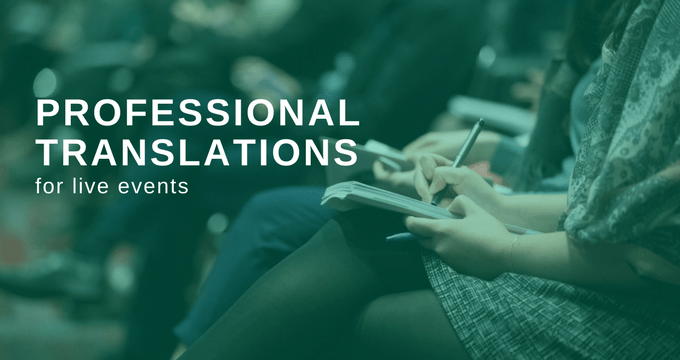
As event planners, organizers, or sponsors, you may not necessarily be boots-on-the-ground regularly at large events. If you are, you’ll know the chaos that they can be, even when just one language is being used prominently. But, what do you do if there’s an audience who do not understand the speaker’s language?
Expert live interpreters are knowledgeable at navigating the ins and outs of communication, even in field-specific scenarios. The one area of every new job that they may lack at first, however, are the specifics of each event. It’s critical to the success of events with bilingual speakers present that every interpreter has an understanding of the event organizer’s expectations, holds certain experience, and how the event will work step-by-step. Without this confidence under their belts, it can be difficult and incredibly stressful for live event interpreters to perform their jobs to perfection.
Put yourself in the shoes of the interpreter: Imagine you’re asked to be a tour guide for a group of travelers at a popular landmark that you know very little about and were not briefed on the location or history beforehand. Even in your own language, the probability that you would know how to describe even the most basic characteristics perfectly would be slim.
The knowledge of the subject matter that interpreters bring to the event is obvious to the attendees, as well. When our own event interpreters were in attendance at the annual United States & Mexico Bar Association, there was a noticeable positive effect on how those in attendance were able to understand more effectively, as well as the stress level of the interpreters themselves.
What Professional Interpreters Need to Prepare
While every new event to interpret at is new and different, there are a few methods in which event organizers and interpreters can better prepare together.
1. Go Over the Full Schedule
Your agenda plays host to all of the information about your event, conveying time frames and detailing whereabouts. To prepare interpreters extensively before an event, it’s useful to provide insight into every part of the day – this should include information on all the different subjects; using tips for correct terminology and briefs, along with the roles of speakers, and expected conversation, in particular, is key here.
2. Provide Event Materials
You should always extract some previous work for background examples – minutes, positions, even general information about the event or organization to give to event interpreters. With this available, your interpreters can gain awareness of how the event is structured and promoted to the public. Make these available in all languages needed, so every interpreter has exactly what they need.
3. Share Your Website
Before any event, you should read over and ensure every part of your website is up-to-date and include information about the event at hand. Sharing your website with interpreters who will be representing your organization will allow them the chance to get to know your brand on a better level, read through your messaging, and look through your product or service offerings closely.
4. Have Open Communication
When the subject or theme of the event is highly-technical or very field-specific, prior communication with live interpreters is especially important. Having a meeting to establish a relationship and open communication days, or even weeks before the event can streamline the whole process ten-fold. During the day of the event, you’re much more likely to forget that the interpreters are there at all.
5. Test the Equipment
Depending on the interpreting equipment you choose to work with, you may or may not need a specific technician on site. Either way, it’s best practice to test all equipment the night before the event to ensure everything runs smoothly and allowing plenty of time for resolutions. In our experience, coupling the equipment set up along with the interpreters who will be in attendance as one event package is the best way to ensure that everything is tested out properly.
6. Hold a Pre-Event Briefing
Just like any other event, a brief highlighting the important factors, potential occurrences, and a walkthrough of the event set up are required. After discussing all the important aspects of the event, offer a Q&A at the end so all interpreters can ask questions, but also for the event planners to ensure the interpreters understand everything in full context. If the topic is highly specialized in one product or service, it’s critical to be on the same page.
You may have thought that interpretation is about impromptu activity, and it is to some extent. With thorough preparation, answers to expected questions are planned for and will allow for a smoother interpretation service. The unexpected will be expected during prime moments of speeches throughout for a successful event.
Not all interpreters are well-versed in all subjects; some can hold more knowledge and experience than others in specialty fields such as sports, arts, legal, or financial events. At Language Department, we handpick the most knowledgeable and skilled interpreters in the specific field of your conference, so that you’re guaranteed expert interpretation for your industry.
We’ve succeeded in many bilingual and multilingual services – providing live interpretation, translation, quality assurance, adaptation, and more in dozens of languages spoken around the world. For event interpreters anywhere who are reliable and well-prepared, contact us today.




